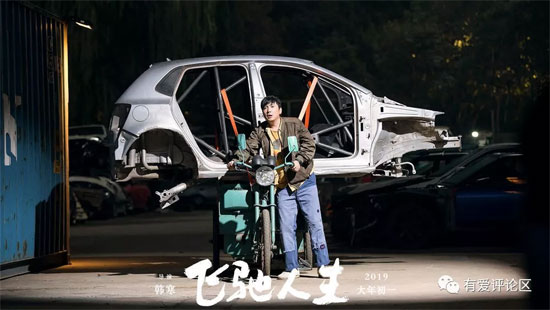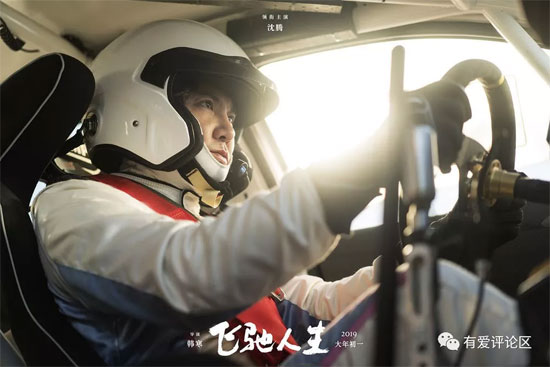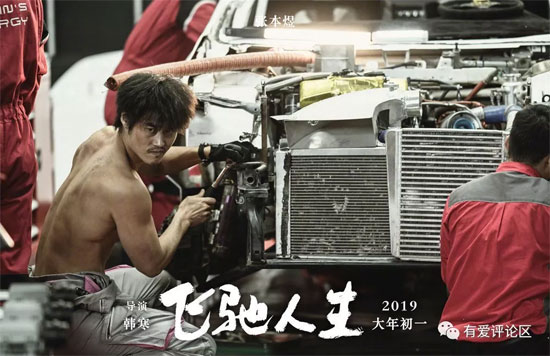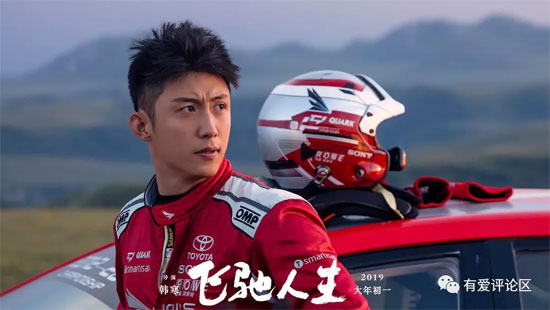Film Name:飛馳人生 / Pegasus
Many may have overlooked an objective fact: “Pegasus” is only Han Han’s third film as a self-taught director, yet it has already proven capable of competing with major directors’ blockbusters during this year’s Spring Festival season. For a director transitioning from another field, this achievement alone is extraordinary.
Of course, this shouldn’t be used to make excuses for Han Han—just like a driver on the track, the final verdict rests solely on the race results. Claims like “he’s a rookie just starting out,” “how tough his journey has been,” “the car malfunctioned,” or “the handshake was awkward” are all just excuses.

Personally, judging purely by the film’s completion, “Pegasus” falls short of “Duckweed”… The film suffers from a noticeable disconnect between its first and second halves. The narrative-heavy opening segment, while passable in quality, contains several flaws. Conversely, the racing sequences in the latter half are professionally executed and thrilling, radiating a compelling focus.
So, is “Pegasus” a success? For Han Han, who possesses an immense passion for racing, it certainly is.
[Friendly reminder: Spoilers ahead.]
The film is a quintessential example of the “explosive, all-out action manga” genre. Sports-themed films and animations particularly favor this narrative arc: Once an unrivaled racing legend, he suddenly falls from grace after an unexpected setback. Glory, honor, wealth, and loved ones vanish one by one, plunging him into a bitter low point. He eventually returns to the track, re-entering the competitive arena. Though the racing world has changed beyond recognition, regardless of the race’s outcome, he remains a hero worthy of respect.

Throughout history, “formulas” have remained largely similar, differing only in their level of skill.
Han Han never shies away from his signature brand of deadpan humor in his work. Combined with the film’s broadly defined plot direction, he naturally focuses his playful antics on amplifying the character’s tragicomic struggles.
Casting Shen Teng as the male lead was arguably one of the film’s most inspired decisions: not only does his current persona as a cheeky, greasy urban everyman lend itself perfectly to comedy, but more crucially, his innate comedic charm resonates deeply with Han Han’s seemingly nonchalant brand of “Han-style humor”—both share that mischievous quality where “you haven’t even laughed yet, but everyone else is already cracking up.”

Since his debut novel “Triple Gate,” Han Han has been a masterful gag writer. Nearly two decades later, he remains a gag writer who keeps pace with the times.
When it comes to pure humor, the clever jokes in Pegasus deliver for the audience. They’re relatable (the difficulty of the driving test), nostalgic (replacing the expected “Knights of the Zodiac” BGM with “The First Slam Dunk”), and pop-culture savvy (“Please like… support me”). They’re fresh and entertaining without feeling overly clichéd.
Yet a glaring flaw remains: the jokes feel overly formulaic. While the examples above represent the more inventive attempts, the vast majority of laughs rely on “instant backfiring” and “oh-so-delicious” tropes. The variety may seem abundant, but the flavor is always the same…

Take the scene where Zhang Chi and Sun Yuqiang approach their boss for investment sponsorship. They pull off a “combo move” that works well but pushes the audience to the brink of aesthetic fatigue and plummeting goodwill. Thankfully, the plot quickly shifts to the latter half; otherwise, this approach might have backfired.
That’s why I feel “Pegasus” falls short of ‘Duckweed’ in storytelling and humor (after all, that film had richer content), and hasn’t even made much progress compared to Han Han’s debut “The Continent”… For someone who left me with an impression of “rapid growth,” this is a pretty significant drawback.
However, the core of this film lies elsewhere.

“Pegasus” is less an attempt by Han Han to challenge the “purity” of filmmaking and more an outpouring of his overflowing passion—a love letter to his own enthusiasm.
“Han Han is simply mad about racing.”
Ever since he started making movies, Han Han has openly smuggled in his personal obsessions: The road movie framework of “The Continent,” the racing elements woven into “Duckweed”—all reveal the director’s deep affection for the motorsport world. This time, he has essentially ‘abandoned’ the meticulous development of narrative content, instead focusing entirely on presenting the essence of “racing” itself: rally competitions, the Bayinbuluke Circuit, racing components, driving techniques, live broadcasts… He pours everything he knows and loves into this project.

I vividly recall reading “Like a Youth Racing” years ago, where Han Han unapologetically packed the book with extensive car/racing-related descriptions and technical jargon (not to mention his later work “Just Drifting Along”). For those unfamiliar with or uninterested in cars, this content felt utterly dry and tedious… Yet the unadulterated passion radiating from his words resonated with readers.
This is the infectious “magic” of genuine dedication—what we often call “the beauty of focus.”
This joyful, wholehearted immersion is embodied in the film as an obsessive, stubborn pursuit of rally championship glory: During his five-year suspension, Zhang Chi practiced endlessly with a washbasin, dartboard, and steamer basket. Sun Yuqiang abandoned his job and wife without hesitation, using his savings to support his friend. Ji Xing risked his life, bare-chested, time and again, giving and saving the lives of race cars…

In the blink of an eye, Han Han crafted “Pegasus” into China’s finest racing film (those who understand cinema lack the expertise, while racing enthusiasts can’t direct—domestic films of this genre were virtually nonexistent, with memories stretching back only to “Initial D”…).
“A man remains a boy until he dies.” Han Han unleashes youthful vigor throughout the film, using the surface-level weariness of middle age merely as seasoning. “Unwavering sincerity” is the film’s core spirit.
This “youthful spirit” can be petty. Everyone dreams of a “fallen master returning to dominate the scene,” and even Zhang Chi himself silently recites this simplistic, childish dichotomy. Making his son write the idiom “destroy Lin Zhendong” twenty times—how uplifting does that sound?

But this youthful vigor would eventually transform into a weighty solemnity.
Zhang Chi clung stubbornly to his dignity, refusing to seek help from his opponent. Step by step, he watched as the last remnants of his pride were stripped bare. Then, just before the match began, fate played another cruel joke on him—forcing him to finally accept Lin Zhendong’s assistance… Zhang Chi came to understand a truth: even if it meant abandoning all vanity and pride, swallowing his pride, he must achieve his goal. Competition is competition.
At this point, I deeply admire Han Han’s astute and straightforward stance of fairness: in “Pegasus,” there are only opponents, no enemies.

The film neither curls up in the “veteran’s” position to peddle old wisdom nor bounces around in the “youngster’s” stance to shout and clamor… New race cars and new drivers are inherently faster and stronger; they can use new technology and new ideas to achieve what their predecessors once deemed impossible. nor are veteran drivers utterly obsolete—they can continue guiding the younger generation forward with their wealth of experience and unflappable resolve.
By the standards of a narrative feature, “Pegasus” falls short in quality. Yet as a sports genre film, its professionalism, integrity, and uplifting spirit make it thoroughly commendable and genuinely likable.
Han Han conveys a simple yet romantic pursuit through this film, which surfaces in its closing moments:

“Dedicated to everything we love.”
PS: The “Overwatch” cameo in the film’s post-credits scene was brilliant! The line “heroes never die” cleverly resolves the uncertainty surrounding Zhang Chi’s cliff-plunge and subsequent drowning. Those who get the reference will find it especially rewarding.
Please specify:Anime Phone Cases » Pegasus 飛馳人生 2019 Film Review: Overcome yourself, love yourself